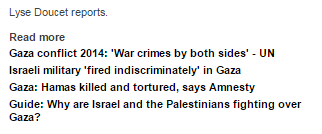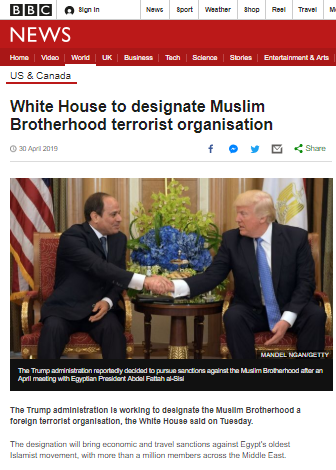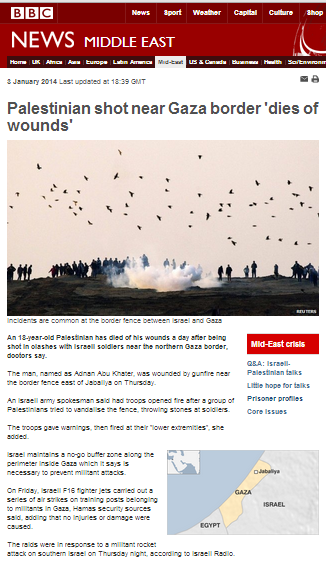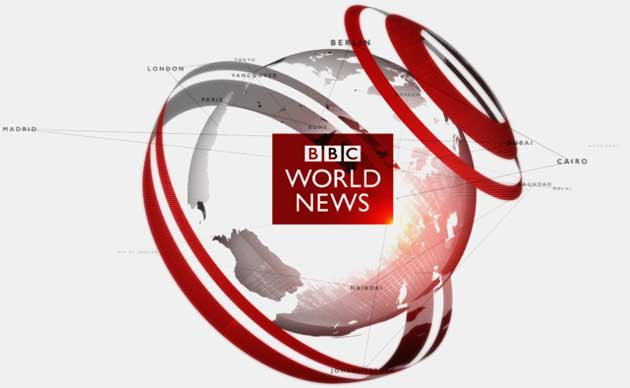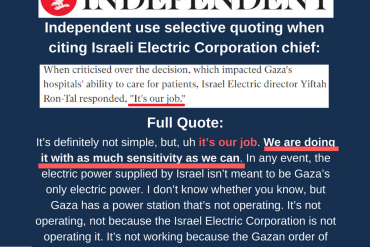In addition to the written article about the newly released UN HRC report which appeared on the BBC News website on June 22nd, the corporation produced two filmed reports for BBC television news programmes, both of which also appeared on the website.
The first report – dated June 22nd and titled “Gaza conflict: ‘War crimes by both sides’ says United Nations” – is by Lyse Doucet and – like the UN commission which revealingly titled its report as being about the “Gaza conflict” of 2014 – Doucet’s opening lines negate the fact that hostilities took place in Israel too.
“The war last summer was the third in Gaza in six years. This one was the most protracted, most punishing, between Israeli forces who attacked Gaza and Palestinian armed groups who fired rockets and dug tunnels into Israel.”
The fact that Hamas initiated the hostilities and that the fighting was protracted because time and time again Hamas refused the ceasefires offered on numerous occasions is obviously not deemed need to know information for BBC viewers. Doucet continues:
“Now an independent inquiry says both sides may have committed war crimes.”
As was the case in the BBC’s written report, Doucet makes no effort whatsoever to inform audiences of the inquiry’s ignominious beginnings or of the ensuing report’s many problematic aspects – not least its reliance on ‘evidence’ from anti-Israel activists and political NGOs engaged in lawfare against Israel. And so, with no critical analysis of the report’s value and validity offered to audiences, Doucet goes on to promote some cherry-picked quotes against a background graphic again featuring a literally one-sided picture.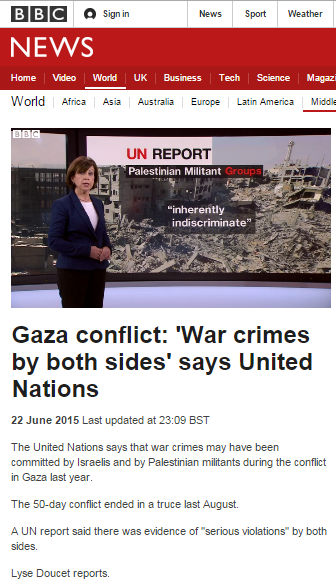
“The purpose of this UN report was to gather testimony. It’s damning on both sides. On Israeli forces it says ‘impunity prevails across the board’. It also calls on Israel to break with its ‘lamentable track record of holding wrongdoers accountable’. And the attacks carried out by Palestinian militants were in its words ‘inherently indiscriminate’ and Palestinian authorities have also consistently failed to bring to justice those who violate international law.”
Doucet makes no effort to clarify to audiences that one of the report’s many shortcomings is its failure to acknowledge the fact that “Palestinian authorities” in the Gaza Strip are the exact same people carrying out the war crimes, targeting Israeli civilians and performing extra-judicial killings of political opponents.
After a clip showing the reaction of the Israeli prime minister, Doucet’s report shows Hamas’ Ghazi Hamad saying:
“I don’t know from where that they believe that Hamas focus on the civilians; that they target civilians. And I think they should blame Israel that they did not give them permission to enter Gaza and to make investigation in Gaza and to listen to people.”
Doucet makes no effort to inform viewers that Egypt too refused the commissioners entry to the Gaza Strip via its territory.
The impression audiences are intended to take away from this report is amply clear in Doucet’s closing remarks which dedicate ten words to a very sterile presentation of the Israeli side of the story and almost four times as many words to description of the Gazan side.
“Last summer Israelis lived with indiscriminate and constant rocket fire. And in Gaza we saw the huge price paid by civilians in the densely populated and impoverished territory. The report speaks of unprecedented devastation. Nearly one year on many Gazans still live in the rubble of their homes.”
Likewise, the links offered to visitors viewing this report on the BBC News website display a similar lack of impartiality.
Audiences are offered the BBC’s uncritical and unchallenging written report on the same story, a BBC News report from May 2015 which amplified anonymous claims promoted by the inadequately presented political NGO ‘Breaking the Silence’ (a major contributor to the UN’s report), and another BBC News report from May 2015 which amplified a report by Amnesty International (also a significant contributor to the UN report) whilst ‘contextualising’ Hamas torture and execution. Most notably, audiences are also provided with a link to a seriously flawed ‘guide’ produced by CBBC (the BBC’s children’s department) which has still not been corrected since its publication last August.
The following day – June 23rd – viewers of BBC television news programmes saw another filmed report – this time by Yolande Knell and titled “Gaza conflict: War crimes on both sides, says UN” – which again included no critical analysis of the UN report whatsoever.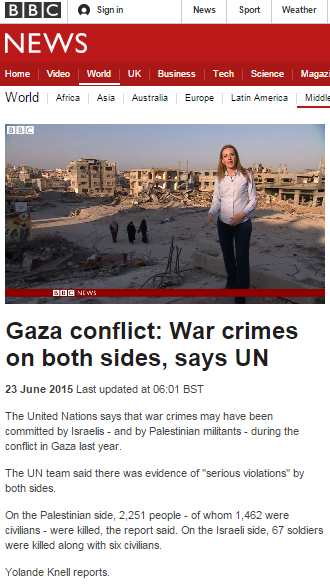
Viewers found Knell using the standard ‘Israel says’ formula in her opening sentences – employed regularly by the BBC to communicate to audiences that it does not endorse the statements which follow.
“Over fifty days last summer the Gaza Strip was pummeled by Israeli airstrikes and shelling. Israel says it was targeting tunnels used by Palestinian militants and trying to stop them firing volleys of missiles at its towns and cities. Now a report commissioned by the UN Human Rights Council says it’s possible both sides committed war crimes. But Israel rejects the findings as biased. It says its actions in Gaza were meant to protect its civilians and its own inquiries found it acted lawfully.”
Like Doucet before her, Knell has nothing to tell viewers about why, when or how the report was commissioned or of the political agendas of some of the sources of the testimonies and information appearing in the report. Knell goes on to amplify the view of the terrorist organization which initiated the conflict:
“Today in Gaza the Hamas authorities said the report created a false equality between victims and their killers.
She goes on, failing to inform audiences of the political back story to the UN’s casualty figures which the BBC has been religiously quoting and promoting for almost a year.
“The war left widespread destruction across Gaza and some 2,200 Palestinians were killed. The UN says most were civilians but Israel disputes that. On the Israeli side 73 were killed – mostly soldiers.”
Knell then tells viewers that:
“The UN investigators weren’t able to come here to Gaza to see scenes like this for themselves and to meet the residents because Israel refused to cooperate with them.”
As was the case in the previous day’s written article and in Doucet’s filmed report, she fails to mention that Egypt also did not grant the commission entry – even though that fact is noted in the UN report.
“The commission repeatedly requested Israel to cooperate, including by granting it access to Israel and the Occupied Palestinian Territory, including the West Bank, East Jerusalem and the Gaza Strip. Regrettably, Israel did not respond to these requests. Subsequently, the commission learned from a press release that no such cooperation would be forthcoming. The Government of Egypt, when requested to facilitate entry into the Gaza Strip through the Rafah crossing, responded that it was not possible owing to the prevailing security situation.” (emphasis added.)
Knell then goes on to make the following opaque assertion:
“At the same time there’s been a lot of criticism over how Israel carried out its own inquiries into attacks that killed Palestinian civilians.”
How much is “a lot of criticism” and by whom it was levelled is not made clear to viewers. She continues:
“This was one of the most controversial incidents of the war. Four cousins aged 9 to 11 were killed by Israeli missiles while playing on the beach. The UN commissioners criticized the Israeli army’s inquiry which cleared the soldiers of any wrongdoing.”
Indeed they did, but Knell does not attempt to make any critical examination of whether or not that criticism was relevant or justified – hardly surprising perhaps when one considers that the BBC only recently elected to pass up the opportunity to correct the misleading impressions it too propagated regarding that same incident.
Knell closes by narrowing down audience attention to possible war crimes in one location alone:
“It’s calm now on the Gaza beachfront – almost a year on from the fierce fighting. But with further investigations underway, the bitter debate about whether war crimes were committed here is set to continue.” [emphasis added]
The BBC’s three reports on this topic have all been superficial, uncritical and unchallenging. Audiences have had no choice but to take the slivers of the report’s content selected by BBC journalists for amplification at face value and no attempt has been made to objectively inform them of the political background to the commission and its report. Likewise, no effort has been made to put the process and content of this report into its wider context of the effect it may have upon all Western armies fighting terrorists anywhere in the world.

